As Wednesday, Friday and Saturday evenings roll around each week, students consult their bin, bag or drawer stuffed with flair — “brightly colored” and/or “random, wacky clothing,” according to Sam Frohlich ’25. They dig through piles of sparkly skirts, jerseys, random hats or silly t-shirts in search of something to match a party’s theme — or perhaps just “to make you look a little weird,” Kalyn Dawes ’25 said.
“Flair is a little bit crazy and usually targeted towards some kind of event or theme,” Dawes said.
This is especially true during sophomore summer, according to some students. Dawes said she noticed that her peers are committed to going out in flair this summer — perhaps as an extension of an eagerness to embrace all aspects of sophomore summer.
“I feel like the [willingness to] buy-in that generally people have for sophomore summer extends itself to flair,” Dawes said. “More people are going out, and people just commit harder to themes. Even the themes are a lot more extravagant.”
Dawes referenced Sigma Delta sorority’s recent “‘Mamma Mia’ murder mystery” and “spiked watermelon ‘Hunger Games’” tails themes as examples of more “extravagant” themes than usual.
Yet, Frohlich said he prefers classic and easy-to-dress-for themes over more extravagant ones.
“When something’s easy to dress for, everybody dresses for it,” Frohlich said. “If it’s trickier, then I think some people just show up in regular outfits, and it’s not as exciting.”
All the students interviewed said that they are not embarrassed to wear flair.
“If anyone ever questions you, you can be like, ‘Oh, it’s for a theme,’ or ‘it’s flair,’ and then no one really bothers you,” Frohlich said.
Some students mentioned that they feel especially inclined and proud to wear flair when surrounded by members of their own class. Dawes shared that she feels more comfortable going out with only “familiar faces” as opposed to acquaintances or “scary upperclassmen.” Ryan Davi ’25 echoed this sentiment.
“Sophomore summer is the best time to really go all out for a theme because it’s just your class,” Davi said. “The stakes of feeling weird in whatever you’re wearing are way lower. The best flair is the stuff you can’t explain why you would ever possibly have.”
Additionally, students mentioned that sophomore summer is an excellent opportunity to wear flair because most students have now accumulated flair — whether it is brought, bought or bequested. Bequests are items which are usually, but not exclusively, clothing. They are passed down from graduating seniors to younger students within the same organization: Greek houses, sports teams, performance groups, DOC subclubs or just friends.
Bequests have range: they can be sentimental, silly or hand-picked for a specific theme, according to some students. Dawes explained that bequests keep flair alive and allow graduating seniors to leave a legacy.
“There’s no better way to leave a lasting legacy on the school than to make sure every stupid thing you’ve ever bought is continually worn for the next 10 years,” Dawes said.
Dawes also highlighted how bequests are a material bond between the person who gives the item and the person who receives it.
“I feel really connected to the people that gave me flair,” Dawes said. “I think about them every time I’m going out with their outfits on.”
Abraham Kamara ’25 explains that bequests help maintain relationships with upperclassmen, sharing that his oldest bequest dates back to 1990.
“Bequests are a little way to keep that person in your life,” Kamara said.
Frohlich similarly noted that bequests establish a bond between the various owners.
“You are wearing something that has come a long way to get to you,” Frohlich said.
Some students said that people tend to feel more comfortable and motivated within their organizations as a result of bequests.
“I felt very seen and valued by the communities that gave [bequests] to me,” Dawes said.
“[Bequests] are kind of a subtle reminder that you are a part of something a little bigger than yourself,” Frohlich said.
In most organizations, there is a ceremony dedicated to passing down bequests. These ceremonies vary in length. Kamara said the Thelta Delta Chi fraternity’s bequesting ceremony is long and emotional for graduating seniors.
“The TDX bequests are a reflection [for seniors] on the last four years,” Kamara said. “[The ceremony] is around 12 hours — I think ours went from 3 p.m. to 3 a.m.,” Kamara said.
Some bequests do not pertain to flair. For example, the Dog Day Players improv comedy group have many softball-related bequests connected to the sophomore summer softball league. Daniel Lampert ’25 was bequested a “book of insults … meant to read to the other team.”
Kamara shared that his pledge class in TDX will introduce a new sophomore summer bequest: a “house boat” that will be bequested to each successive class once they enter their sophomore summer.
Ultimately, bequests and flair contribute to a unique campus culture — particularly necessary, as Dawes reflects, because of Dartmouth’s remote location.
“I feel like we don’t have much to do here, and if we were just going to wear normal outfits every night, it would get really boring,” Dawes said. “So we’re going to have fun themes, and then fun themes come with fun outfits, and then that just devolves into craziness.”
With just the ’25s on campus, there’s a more intimate social environment than a normal term. When coupled with the “buy-in” spirit of the summer, flair, bequests and sophomore summer seem to go hand-in-hand.




